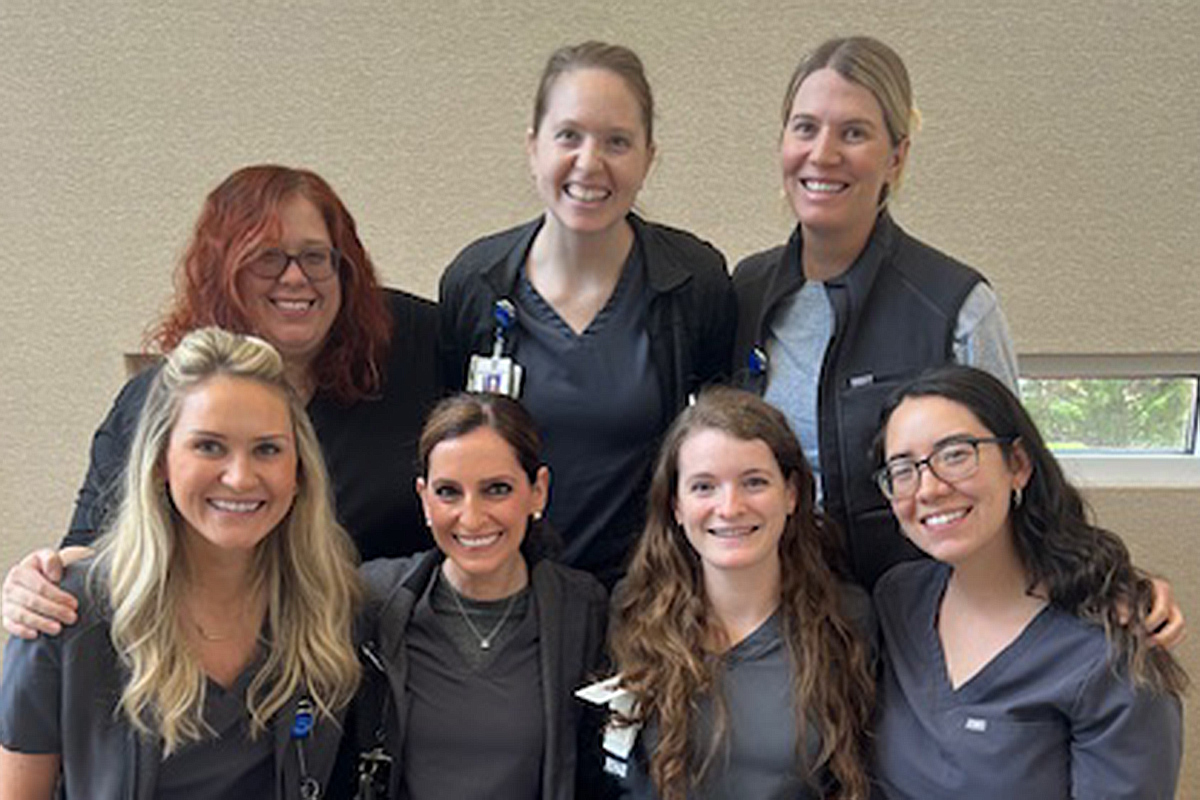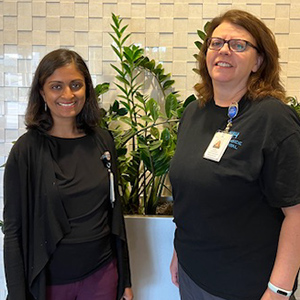
Aphasia is a language disorder which impacts an individual’s ability to find the words to speak, understand, read and write due to damage to the language center in the brain, even though intelligence is mostly intact.
Here is what our patients typically say to describe this: “I know what I want to say, and the word is on the tip of my tongue but it doesn’t want to come out. What I am thinking and what I am saying don’t match.”
Aphasia can be caused by a stroke, head trauma, brain infection or tumor.
It’s devastating to go from being able to talk to losing your ability to communicate suddenly after a stroke. This is what we see when we see our patients for the first time at the hospital.
As an acute care speech language pathologist, it is our role to complete a communication evaluation and provide treatment by facilitating communication of basic needs such as pain, safety, nutrition and bathroom needs, and provide caregiver training to enhance communicative effectiveness. Upon transfer to outpatient, the needs of the patient may vary in complexity to activities such creating a shopping list, placing a restaurant order, participating in a family get together, etc.
Communication devices and technology are also used to augment communication as needed.
What is dysphagia?
We swallow at least 600 times per day, and most of the time it happens on its own. It feels different when you have to intentionally swallow or train your brain to remember to swallow saliva, food, liquids and medications.
Dysphagia is difficulty swallowing and it can be caused by variety of reasons. The most common reasons are cancer or as a side effect of cancer treatment, brain-related disorders such as stroke and Parkinson’s disease, breathing problems such as chronic pulmonary obstructive disorder, pneumonia, prolonged intubation, tracheostomy and being vent-dependent, COVID-19, generalized weakness in the elderly or immunocompromised population, reflux, head and neck surgeries and muscle tension of the swallowing muscles.
Our patients vary in age from about 20-100, however most of our patients are between the ages of 65-90. At Northside Hospital Forsyth, we see these patients at both acute care and outpatient. Our goal is optimizing patient safety, quality of life and level of independence by collaborating with other health care professionals and the patient’s family to provide excellent care.
Starting treatment
If someone is experiencing changes in their communication and/or swallowing, you want to start by scheduling a visit with your primary care physician to evaluate and make the necessary referrals. We require a physician’s order to schedule a visit with Speech Therapy for communication or swallow evaluation and treatment.
 We evaluate swallowing by completing an instrumental assessment of swallowing using gold standard testing: Modified Barium Swallow Study and or Flexible Endoscopic Evaluation of Swallowing. Upon completing this, we come up with a plan of care based on the swallowing muscles that are impaired, etiology of dysphagia and the patient’s overall medical status and support system. These are also diagnostic tools used by our specialists such as neurologists, pulmonologists, gastroenterologists and ear, nose and throat doctors to plan further care.
We evaluate swallowing by completing an instrumental assessment of swallowing using gold standard testing: Modified Barium Swallow Study and or Flexible Endoscopic Evaluation of Swallowing. Upon completing this, we come up with a plan of care based on the swallowing muscles that are impaired, etiology of dysphagia and the patient’s overall medical status and support system. These are also diagnostic tools used by our specialists such as neurologists, pulmonologists, gastroenterologists and ear, nose and throat doctors to plan further care.
In addition, they are also used to assess progress with therapy. It is a fulfilling experience when we can deliver great news to our patients who may be dependent on a feeding tube after a stroke or during radiation for head and neck cancer with improved swallowing after therapy and they can return to eating by mouth and go out to restaurants or socials with family and friends.
We offer intensive evidence-based swallowing treatments including McNeill Dysphagia Therapy, manual therapy for swallowing and voice and VitalStim neuromuscular electrical stimulation.
Functional, traditional and eclectic intervention approaches for speech, voice, language, cognitive communication and swallowing disorders are customized to a patient’s needs and culture.
Prophylactic swallowing therapy is available for head and neck cancer patients prior to radiation to minimize or prevent radiation-induced dysphagia.
Learn more about rehabilitation services at Northside.
Pictured [top] are, front, from left, Lauren Falink, Alanna Mazzara, Lexie Larcinese and Ashley Wilkins; and back row, from left, Rachel Lilly, Erica Bennett and Taylor Underwood. Not pictured is Allison Purcell, CFY.
[Right] Suganya Karthik, left, and Amy Samuelson are speech language pathologists at Northside Hospital Forsyth.

